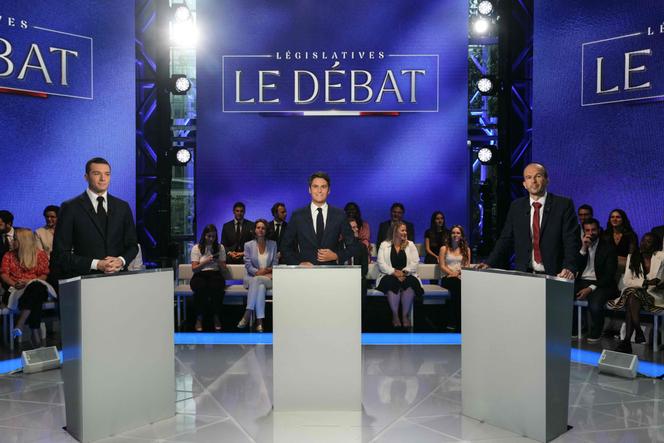


French Prime Minister Gabriel Attal was right to point out, at the very end of the debate, that "the June 30 and July 7 deadline is major," because no part of the 100 minutes that preceded his statement seemed to evoke a historic election. With five days to go before the first round of France's snap legislative elections, which were called after President Emmanuel Macron dissolved the Assemblée Nationale, representatives from the three main blocs faced off on the television channel TF1 on Tuesday, June 25. Flanking Attal were the president of the far-right Rassemblement National party, Jordan Bardella, and a lieutenant of radical left leader Jean-Luc Mélenchon, Manuel Bompard, representing the left-wing Nouveau Front Populaire alliance. The showdown, when it was audible, alternated between financial squabbles and a catalog of promises.
One theme escaped the fray – international affairs – for the simple reason that it didn't come up during the course of the evening. "Unfortunately, because we talked about public services, we won't be able to talk about France in the world. But that will, perhaps, be the subject of other debates," said journalist Anne-Claire Coudray, brushing the question aside. Not a word, then, on the Russian invasion of Ukraine, the European Union, or the Israel-Palestine conflict.
Beyond that, the debate never touched on the issues at stake in an election that will be decisive for the country's institutions. The three representatives of France's main political blocs (the left, center, and far right) did not deviate from the programmatic paths laid out by the two journalists. Each speaker stuck to championing their own roadmap for the country, thereby all too often reducing their antagonisms to petty financial squabbles. This was a far cry from the violent attacks that have fractured the political arena in recent weeks. It was even further removed from the explosion that threatens the Assemblée Nationale, which, according to the polls, is likely to become deadlocked, and could even be overtaken by the far right.
The two aspiring prime ministers present that evening, Attal and Bardella, have often faced off in recent years. However, rarely have they done so with so much restraint. Contrary to the fear Macron expressed the day before of a "civil war" in the event of their side's defeat, the current prime minister presented himself as the defender of the French people's finances, by promising them that there would be no new tax hikes. "A golden rule," he insisted. This was the only rule he had really set himself, to undermine the credibility of his opponents, starting with the poster boy of the far right: "The difference between me and my competitors is that I'm the prime minister and I don't want to lie to the French," adding that he didn't want to promise them "the moon." Attal, who would habitually portray himself as a bulwark against "the extremes" (left and right), never once used the term "far right" throughout the debate.
You have 55.71% of this article left to read. The rest is for subscribers only.
